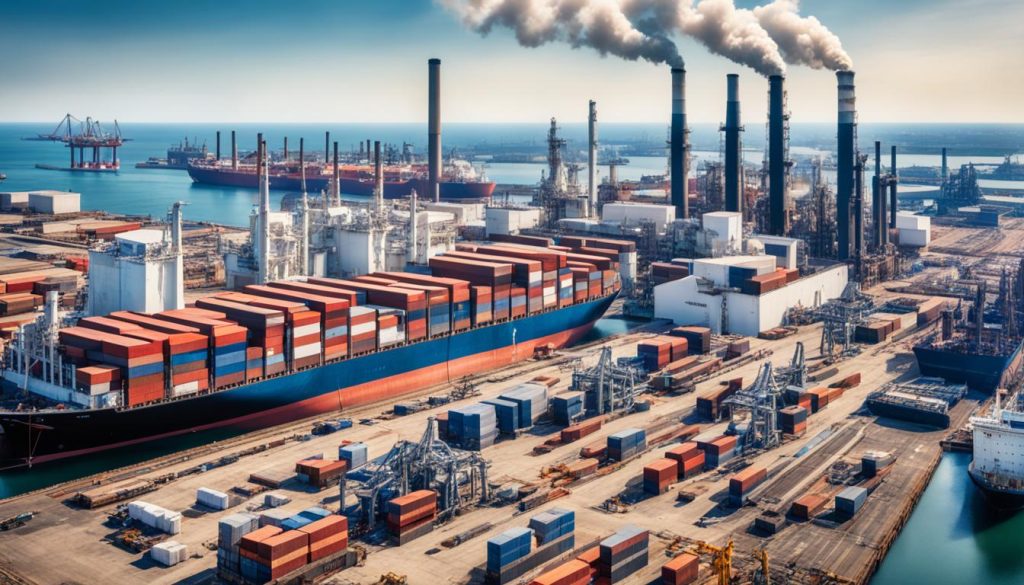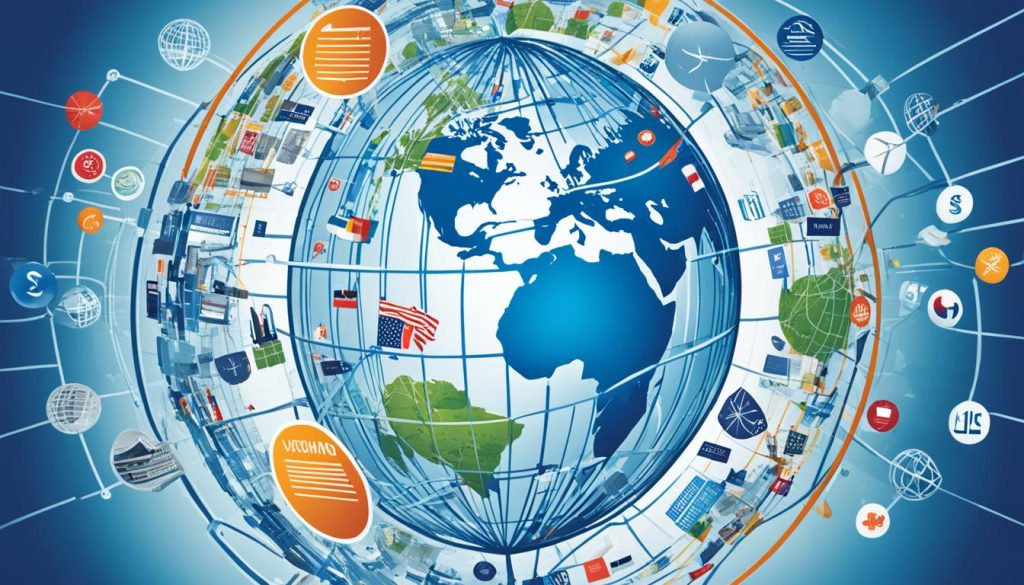Multinational corporations (MNCs) are big players in today’s world economy. They run their businesses across many countries. Their actions greatly impact how global commerce and trade work.
Companies such as Apple, Toyota, and Shell have shown how powerful MNC strategies can be. They not only drive innovation but also create jobs and support economies around the world. This article explains how MNCs achieve success on a global scale.
Key Takeaways
- Multinational corporations (MNCs) are integral to today’s global economy.
- MNCs operate across multiple countries, impacting global commerce and trade.
- Organisations like Apple, Toyota, and Shell exemplify successful MNC strategies.
- Effective strategic planning and transnational scalability are crucial for MNCs.
- MNCs contribute to innovation, employment, and economic development worldwide.
Introduction to Multinational Corporations
Multinational corporations, or MNCs, operate in many countries but are run from one main country. They play a key role in the global economy, connecting markets, cultures, and economic systems. Understanding their impact helps us see how they differ from local businesses.
An MNC does business across borders while its main planning is done from one location. Unlike local companies, MNCs have branches or partners in different areas. They do this to benefit from things like lower costs, better laws, or new markets.
These global companies have a big market impact, earn money in various ways, and have a complicated structure. This includes regional offices. They have to deal with different laws, cultures, and market conditions. Being adaptable and planning ahead is vital for their success.
MNCs are very important in the world economy. They bring innovation, create jobs, and share resources internationally. This boosts economic growth and development. By doing business across borders, MNCs also help in cultural exchange and technological progress.
Historical Development of Multinational Corporations
The story of multinational corporations (MNCs) is fascinating. These companies trace their origins back to the colonial era. Early trading businesses kick-started global commerce. Over the years, MNCs have changed and expanded due to new technologies, economies, and laws.
The Early Beginnings
The East India Company and Hudson’s Bay Company paved the way in the 17th and 18th centuries. They were the first multinational companies. By setting up vast trade networks, they shaped the early days of international trade.
Industrial Revolution and Expansion
The Industrial Revolution was a time of great growth for MNCs. New technology and better transport meant companies could reach further than ever before. Siemens and General Electric are examples of companies that expanded widely during this time. The era transformed trade, making the corporate world what it is today.
Modern Era and Globalisation
In recent decades, globalisation has driven the growth of MNCs. New tech and open trade policies have helped. Companies like Google and Toyota have become integral to the world economy. The evolution of MNCs shows how economic and legal forces shape business globally.
Key Characteristics of Multinational Corporations

Multinational corporations, or MNCs, operate all over the world with a wide range of products. They have complex ways of organising their business. This lets them be known worldwide and do well in different countries.
Global Reach
One main feature of MNCs is they work in many countries. Their global operations help them have a strong worldwide presence. For instance, McDonald’s and Coca-Cola are everywhere, showing their huge influence.
Market Diversification
Diversifying their market is crucial for MNCs. It helps them handle ups and downs in the market. Take Unilever; they make everything from beauty products to foods. This keeps their earnings stable.
Complex Organisational Structures
MNCs often have complicated setups to run their big operations smoothly. They use different regional bases and many management levels. This setup helps in managing everything well. IBM is a great example of managing a big and diverse business with its detailed organisational structure.
Primary Functions of Multinational Corporations
Multinational corporations (MNCs) such as Amazon are key in expanding markets. They develop strategies for global growth. This includes opening new markets and keeping a competitive edge.
They manage resources well across different countries. This ensures they work efficiently and profitably.
Innovation is crucial for MNCs like Pfizer. They spend a lot on research to stay leading in the industry. This approach leads to the creation of new and improved products.
MNCs also focus on making their products fit local tastes and laws. Unilever, for example, develops products that match various consumer needs around the world.
The table below shows how big corporations manage market development, resource use, and innovation:
| Corporation | Market Development Strategy | Resource Allocation Approach | Innovation and Research |
|---|---|---|---|
| Amazon | Strategic expansion into emerging markets like India | Optimising supply chain and local partnerships | Advanced AI and logistics technology |
| Pfizer | Focusing on global pharmaceutical reach | Allocation of significant funds to R&D | Breakthroughs in vaccine research and development |
| Procter & Gamble | Tailoring products to fit regional preferences | Leveraging local resources and materials | Innovative product formulations and packaging |
| Unilever | Customising marketing to regional cultures | Decentralised management to cater to localities | Focus on sustainability and eco-friendly products |
In conclusion, MNCs play a big role in growing markets, allocating resources wisely, and ongoing innovation. Excelling in these fields helps them stay at the top globally.
How Does a Multinational Corporation Work?
Multinational corporations (MNCs) combine strategic business operations with complex supply chains. They aim for efficiency across different markets.
Operational Strategies
MNCs use several strategies to succeed globally. These include:
- Market Entry Strategies: MNCs might enter new markets through joint ventures or mergers. They may also start or buy companies to get local advantages.
- Collaboration with Local Entities: Teaming up with local companies helps MNCs enter new markets smoothly. This allows them to use local networks and know-how.
- Leveraging Comparative Advantages: By taking advantage of lower production costs and local resources, MNCs can improve their global operations.
These strategies help MNCs stay ahead while boosting their efficiency.
Supply Chain Management
Handling a global supply chain is challenging. MNCs work on making their supply chains efficient by:
- Global Supply Chain Optimisation: They manage logistics and production across countries. This ensures things are delivered on time and saves money.
- Technology Integration: MNCs use tech like IoT and AI to keep an eye on their supply chains. This makes operations better.
- Risk Management: They identify and deal with risks from politics, nature, or market changes. This keeps the supply chain safe.
By focusing on strategic operations and supply chain optimisation, MNCs achieve top-notch efficiency. This helps them lead in their industries.
Economic Impact of Multinational Corporations

Multinational corporations greatly affect the worldwide economy. Their main impact includes bringing capital to host countries and creating new jobs. This plays a big part in MNC economic contribution.
These companies cause a big global investment flows. They move resources across borders, improving infrastructure and tech advancements in various areas. This boosts economic stability and connects local markets globally, increasing efficiency and competitiveness. a>
MNCs are also key in creating international employment. They open offices and branches abroad, creating many jobs. This employment boosts people’s living standards and contributes to the economic growth of host countries. The World Bank notes that countries with MNCs often see a GDP increase, showing their economic impact.
It’s been shown that MNCs lead to better economic stats. For example, in China and India, MNCs have resulted in more jobs and GDP growth. The best economies in GDP terms usually have many multinational companies, which help boost economic activity.
| Country | Yearly GDP Increase (%) | New Jobs Created by MNCs (Millions) |
|---|---|---|
| China | 6.3 | 5.2 |
| India | 5.8 | 4.1 |
| Brazil | 3.4 | 2.8 |
Experts often mention MNCs’ role in pushing global investment flows. They are great at channeling investments and creating jobs worldwide. These corporations strengthen the economies of both developing and advanced nations. Their broad economic impact shows how critical MNCs are in today’s global economy.
Regulatory Environment and Compliance
International companies face a big challenge. They must follow many global laws to keep their business legal and avoid fines. This section talks about how important it is for companies to understand these laws, act responsibly, and have good corporate governance.
International Laws and Regulations
International laws are complex, with many different rules. Companies worldwide need to know and follow both local and global laws. These laws help make trade fair, protect human rights, and look after the environment. Companies must manage these rules well to avoid legal problems and be seen as responsible.
Take the GDPR as an example. It requires companies to protect personal data carefully. Following rules like GDPR helps companies stay out of trouble. It also makes people trust them more.
Corporate Governance
Good corporate governance is very important for companies. It includes the rules and processes that guide a company’s actions. Having strong governance means a company is run fairly and openly.
The Volkswagen scandal is a big example of what happens when governance fails. It shows how important it is to watch over a company closely. Good governance helps avoid risks, stay within the law, and ensures that a company acts ethically.
In conclusion, knowing about international laws and having strong governance are key for companies. This helps them follow necessary laws and be responsible. It leads to a better and more ethical business worldwide.
Advantages and Disadvantages of Multinational Corporations
Multinational corporations (MNCs) have a big effect on the world’s economy. They work in many countries and have good and bad impacts. We will look at both the economic upsides and the social and environmental downsides of MNCs.
Economic Benefits
Multinational corporations boost economic growth around the globe. They invest in new tech and infrastructure, which leads to innovation and a better quality of life. They create jobs, reducing unemployment in the countries they operate in.
Their initiatives also help in sharing knowledge and skills. This strengthens local businesses and the economy.
- Employment Creation: MNCs create lots of jobs, often paying more than local companies.
- Technology Transfer: Advanced technologies from MNCs help improve local businesses.
- Economic Diversification: MNCs help make a country’s economy more varied, cutting reliance on just one sector.
Social and Environmental Implications
Even though MNCs have economic benefits, they can also cause problems. They might exploit workers, lead to less cultural diversity, and harm the environment. It’s important to know about these impacts. Many companies are trying to lessen these negatives by focusing on corporate social responsibility (CSR).
| Impact | Positive Aspects | Negative Aspects |
|---|---|---|
| Labour |
|
|
| Cultural |
|
|
| Environmental |
|
|
Corporate social responsibility is key for MNCs to manage their impact on society and nature. Companies like Unilever, Nestlé, and Apple lead by example in CSR. Still, constant effort is needed to make sure these actions really make a difference.
Cultural Challenges Faced by Multinational Corporations

Working with people from many cultures is tough for big companies. Cross-cultural management needs sensitiveness to different cultural ways and ideas.
It’s key to talk well between cultures to work together well. Also, facing language problems needs new teaching methods and help to improve understanding.
Companies like Google and HSBC lead well in this area. They create workplaces that respect and value different cultures.
| Company | Best Practices |
|---|---|
| Focus on inclusive policies and continuous cultural sensitivity training. | |
| HSBC | Implementation of global workforce integration programs and multicultural team-building exercises. |
As these companies grow, focusing on integrating workers worldwide is vital. This approach closes cultural gaps and uses the power of diverse people for better innovation and success.
Strategic Management in Multinational Corporations
Strategic management helps multinational corporations operate effectively worldwide. It includes solid global strategic planning and unique international decision-making processes. These adjust to the varied and fast-changing global settings.
Decision-Making Processes
Decision-making in these corporations is complex. It needs a deep understanding of global markets, cultures, and rules. International decision-making relies on teamwork and facts. Unilever and Nestlé show how to handle different customers and unpredictable markets well. They use the latest analysing methods and up-to-date data to keep their strategies fitting and strong.
Leadership Styles
Leadership in MNCs must be flexible and adaptable to meet global employees’ diverse needs and hopes. Leaders like Satya Nadella from Microsoft and Mary Barra from General Motors use inclusive, change-making, and culture-aware ways to encourage new ideas, teamwork, and progress. Their global strategic planning gives power to local teams but keeps a united global goal. This matches the company aims.
| Company | Leadership Style | Key Strategies |
|---|---|---|
| Microsoft | Transformational Leadership | Empowerment, Inclusivity |
| General Motors | Adaptive Leadership | Innovation, Agile Responses |
Efficient strategic management in MNCs is about mixing good international decision-making with leadership styles that fit global work. This mix helps MNCs grow sustainably and stay ahead globally.
Technological Influence on Multinational Corporations
Technology has changed the way big companies work. Multinational corporations have become more efficient and connected by embracing digital change. Tools like artificial intelligence (AI), data analytics, and cloud computing make hard tasks easier and predictable.
Companies like Salesforce and Samsung show how new tech changes their operations. Salesforce uses cloud computing for powerful customer management software. This helps businesses around the world track customer interactions well. Samsung uses AI and data analytics to make its supply chain and production better. This cuts costs and boosts product quality.
Technology lets multinational corporations quickly adapt to market and consumer changes. This speed, driven by digital change, keeps them competitive in a digital age. Also, staying innovative helps companies keep their lead by using the latest technologies in their work.
The following table highlights some key technologies and their impacts on multinational corporations:
| Technology | Impact |
|---|---|
| Artificial Intelligence (AI) | Enhances decision-making and operational efficiency |
| Data Analytics | Improves market insights and customer understanding |
| Cloud Computing | Facilitates scalable and flexible IT solutions |
In summary, using advanced technologies helps multinational corporations be more dynamic and responsive. They can quickly face global business challenges and find opportunities. By embracing tech, these corporations keep improving their operations and how they interact in the market.
Case Studies of Successful Multinational Corporations
Looking into how brands like Apple, Toyota, and Unilever win globally offers key lessons. These giants succeed by using strong strategies and new market ideas.
Apple stands out due to its constant innovation and solid strategies. It leads in tech by being a top player in design, software, and how it treats customers. This approach shows how to excel across various global markets.
Toyota shows the value of global strategies and being operationally excellent. It focuses on quality and efficiency to enter and do well in many markets. Its reputation for being reliable and innovative comes from constant improvement and lean manufacturing.
Unilever’s story is about leading the market by being diverse in strategy. It grows by focusing on sustainability and being socially responsible. This has let Unilever grow its product range and build a strong company that can quickly adapt.
| Corporation | Key Strategy | Outcome |
|---|---|---|
| Apple | Innovative Design and Customer Experience | Market Leadership in Technology |
| Toyota | Quality and Efficiency Focus | Global Automobile Market Penetration |
| Unilever | Sustainability and Responsible Growth | Diverse Product Range and Social Impact |
These examples show that leading multinationals use unique strategies to stay on top. By studying their stories, other businesses can find what it takes to succeed globally.
Future Trends in Multinational Corporation Operations
As we look to the future, global businesses face new challenges. Multinational corporations (MNCs) must adapt to trends that shape how they operate. A key trend is the focus on sustainability. Governments and consumers want companies to be green. So, multinationals have to embrace sustainable practices to stay ahead and keep public trust.
Growth is also happening in emerging markets. Countries across Asia, Africa, and Latin America offer major growth chances. Their middle classes are growing, and economies are booming. Companies must understand and connect with these regions. They need to create local strategies and strong local relationships. Understanding the local culture and laws is crucial.
The digital economy is changing how companies work. Technologies like artificial intelligence, blockchain, and the Internet of Things are key. They can make supply chains better, improve decisions, and help with global teamwork. Being digital is essential for any business that wants to keep up with global competition.
Changes in world politics and laws will also impact MNCs. Trade policies, tariffs, and political issues are challenges that companies must face. Staying flexible is vital, says McKinsey & Company. Firms must be agile and forward-thinking. This will help them not just stay afloat but also thrive in the global business world.
















